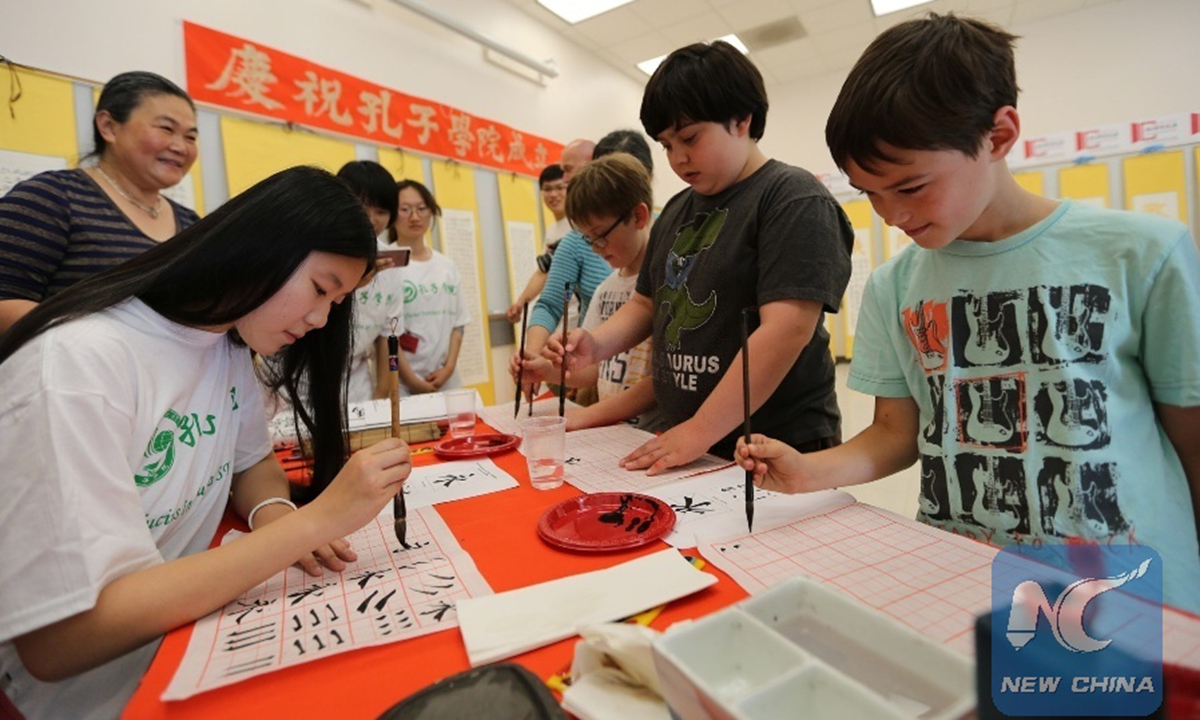US think tank’s smears against China-US academic exchanges reveal its pathological mentality

American students practising Chinese calligraphy at the Confucius Institute in San Francisco, US, September 27, 2014. Photo: Xinhua
The Foundation for Defense of Democracies (FDD), a US think tank, issued a report on Thursday, saying dozens of US universities that conduct defense research are supporting China's military buildup and defense modernization.This report, according to the author, received guidance, expertise, and direction provided by the FDD team, including the FDD China Program Chairman Matthew Pottinger, who served as the US deputy national security advisor in the Trump administration. Pottinger's attitude toward China is rather distorted and extreme, leading to the report with his participation being partly motivated by this prejudiced attitude.
This report reflects the pathological mentality of some people in the US, similar to the "persecutory delusions." It also shows an "apocalyptic view" which becomes more evident since the Trump era, with people believing that the US might re-win the big lead in the world if it maintains its advantage in some key technologies, despite its precarious position.
A Wall Street Journal article also expressed concerns about how Beijing might be using MIT's brain-related research in support of Chinese military through academic cooperation. Indeed, brain sciences are the most cutting-edge technology for human beings since our understanding of this organ is still a scientific blind spot. As such, open joint research in this field by universities in various countries is needed to help human progress.
China needs to remain normal and alert to US' apocalyptic view as it drowns out the sober voices of the elites and will further distort the American public's perception toward the world in general and China in particular, fooling the whole American society.
Chinese and American universities have been maintaining diverse contacts and exchanges since China's reform and opening-up, which have benefited both countries. The FDD report is confusing the distinction between the concepts of knowledge and specific secret technology. Everyone has the right to attend any university worldwide as the knowledge itself is shared by humanity instead of being restricted by certain countries. Should classical mechanics be blocked to other countries? That is obviously not possible.
The knowledge provided by American universities is common to humankind and is beneficial to promote the development of scientific research in both countries through academic exchanges. China has always accepted that some specific institutes and laboratories of the US have never been open to Chinese scholars. But common knowledge of humankind, such as the academic cooperation mentioned in the FDD report, should not be under restrictions despite the competition between the two major powers.
Against the poisoned US political climate, individual universities may come under pressure, in part, from the US government to groundlessly believe that the development of Chinese military benefits from US' science and research. However, China's military development has always been independent under the all-out blockade of the US. Many of China's new technologies have nothing to do with the US, but Washington has always been reluctant to face the independent development capabilities of China's military industry. US media outlets' reports on China's hypersonic weapons are a lesson to the Americans, as China's technology involved is far ahead that of the US.
China's route of military development is different from that of the US, which mirrors the divergence of military strategies of the two countries. China has never considered spending 4 percent of its GDP or more to surpass the US militarily. What is unique about China's military technology approach is that China is committed to seeking technological breakthroughs in a few key areas at minimal cost, instead of following the US' path.
Furthermore, the report said, "the US government should foster alternative Chinese-language initiatives to outcompete CI [Confucius Institutes] language programming." The US has fallen into a contradictory situation - although the country has a huge demand for talents who are equipped with outstanding Chinese language capability, it tries to avoid China controlling its Chinese language education and hopes to develop such talents on its own. Confucius Institutes around the world are all jointly funded by China and their host institutes. They provide primary Chinese education and have never had the intention or ability to "control" the Chinese education market in their host countries.
The US is in a very unstable mind-set, just like an irritable colleague. China should keep a distance from it and be fully prepared, in case it goes out of its mind. China is committed to maintaining the stability of its relations with the US, but it must also make adequate preparations for the breakdown of bilateral relations.
The US is in line with one aspect of Trump's rhetoric, which is to turn it into an unpredictable and elusive country. The future of the US remains unclear even from the perspective of Americans. Biden's words at the "summit for democracy" show that the US has become a directionless country where anything can happen.
The author is a research fellow at the Chinese Academy of Social Sciences. opinion@globaltimes.com.cn



